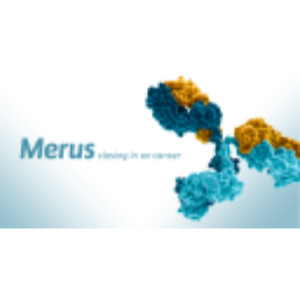Merus Announces First Patient Dosed in LiGeR-HN1, a Phase 3 Trial Evaluating Petosemtamab in Combination with Pembrolizumab in 1L r/m HNSCC
Rhea-AI Summary
Merus N.V. (Nasdaq: MRUS) has announced the dosing of the first patient in its phase 3 trial called LiGeR-HN1. This trial evaluates the efficacy and safety of petosemtamab, a Biclonics® targeting EGFR and LGR5, in combination with pembrolizumab, compared to pembrolizumab alone as first-line therapy for patients with PD-L1+ recurrent/metastatic head and neck squamous cell carcinoma (r/m HNSCC).
The company has received confirmation from the U.S. Food and Drug Administration (FDA) that petosemtamab 1500 mg every two weeks is appropriate for further development in HNSCC as monotherapy and in combination with pembrolizumab. Merus' CEO, Bill Lundberg, expressed confidence in petosemtamab's potential to become a new standard of care across r/m HNSCC and possibly beyond, based on strong phase 2 clinical data.
Positive
- First patient dosed in phase 3 trial (LiGeR-HN1) for petosemtamab in combination with pembrolizumab
- FDA confirmation of appropriate dosage for further development
- Strong phase 2 clinical data reported for petosemtamab in HNSCC
- Potential for petosemtamab to become a new standard of care in r/m HNSCC
Negative
- None.
News Market Reaction 1 Alert
On the day this news was published, MRUS gained 4.65%, reflecting a moderate positive market reaction.
Data tracked by StockTitan Argus on the day of publication.
UTRECHT, The Netherlands and CAMBRIDGE, Mass., Sept. 30, 2024 (GLOBE NEWSWIRE) -- Merus N.V. (Nasdaq: MRUS) (Merus, the Company, we, or our), a clinical-stage oncology company developing innovative, full-length multispecific antibodies (Biclonics® and Triclonics®), today announced that the first patient has been dosed in the Company’s phase 3 trial evaluating the efficacy and safety of petosemtamab, a Biclonics® targeting EGFR and LGR5, in combination with pembrolizumab, compared to pembrolizumab as first line (1L) therapy for patients with PD-L1+ recurrent/metastatic head and neck squamous cell carcinoma (r/m HNSCC), referred to as the LiGeR-HN1 trial.
Merus has confirmed through feedback with the U.S. Food and Drug Administration (FDA) that petosemtamab 1500 mg every two weeks is appropriate for further development in HNSCC as monotherapy, and in combination with pembrolizumab.
“Based on our strong phase 2 clinical data reported previously for petosemtamab in HNSCC both as monotherapy and in combination with pembrolizumab, I continue to be confident that petosemtamab has the opportunity to become a new standard of care across r/m HNSCC and potentially beyond,” said Bill Lundberg, M.D., President, Chief Executive Officer of Merus. “Our recently announced alignment with the FDA on phase 3 dose, and excellent execution to date has allowed us to promptly initiate our registration trials in 1L and 2/3L HNSCC.”
More details of the trial can be found at clinicaltrials.gov.
About LiGeR-HN1
LiGeR-HN1, a phase 3 trial, will evaluate the safety and efficacy of petosemtamab in combination with pembrolizumab, compared to pembrolizumab in 1L PD-L1+ r/m HNSCC patients. The trial is open to adult patients eligible to receive pembrolizumab as 1L monotherapy with tumors expressing PD-L1, CPS ≥1. The primary endpoints are overall response rate as assessed by BICR based on RECIST v1.1 and overall survival. Secondary endpoints are duration of response and progression free survival. Merus plans to enroll approximately 500 patients in the trial.
About Petosemtamab
Petosemtamab, or MCLA-158, is a Biclonics® low-fucose human full-length IgG1 antibody targeting the epidermal growth factor receptor (EGFR) and the leucine-rich repeat containing G-protein-coupled receptor 5 (LGR5). Petosemtamab is designed to exhibit three independent mechanisms of action including inhibition of EGFR-dependent signaling, LGR5 binding leading to EGFR internalization and degradation in cancer cells, and enhanced antibody-dependent cell-mediated cytotoxicity (ADCC) and antibody-dependent cellular phagocytosis (ADCP) activity.
About Head and Neck Cancer
Head and neck squamous cell carcinoma (HNSCC) describes a group of cancers that develop in the squamous cells that line the mucosal surfaces of the mouth, throat, and larynx. These cancers begin when healthy cells change and grow in an unchecked manner, ultimately forming tumors. HNSCC is generally associated with tobacco consumption, alcohol use and/or HPV infections, depending on where they develop geographically. HNSCC is the sixth most common cancer worldwide and it is estimated that there were more than 930,000 new cases and over 465,000 deaths from HNSCC globally in 2020.1 The incidence of HNSCC continues to rise and is anticipated to increase by
1 Sung et al. CA Cancer J Clin, 71:209-49, 2021; 2 Johnson, D.E., Burtness, B., Leemans, C.R. et al. Head and neck squamous cell carcinoma. Nat Rev Dis Primers 6, 92 (2020)
About Merus N.V.
Merus is a clinical-stage oncology company developing innovative full-length human bispecific and trispecific antibody therapeutics, referred to as Multiclonics®. Multiclonics® are manufactured using industry standard processes and have been observed in preclinical and clinical studies to have several of the same features of conventional human monoclonal antibodies, such as long half-life and low immunogenicity. For additional information, please visit Merus’ website, X, and LinkedIn.
Forward-Looking Statements
This press release contains forward-looking statements within the meaning of the Private Securities Litigation Reform Act of 1995. All statements contained in this press release that do not relate to matters of historical fact should be considered forward-looking statements, including without limitation, statements regarding the evaluation of petosemtamab in patients with HNSCC in monotherapy and in combination with pembrolizumab, our design and execution of the LiGeR-HN1 trial, our belief, through feedback with the U.S. FDA, that petosemtamab 1500 mg every two weeks is appropriate for further development in HNSCC as monotherapy, and in combination with pembrolizumab; our belief that petosemtamab has the potential to become a new standard of care across r/m HNSCC; and our belief in alignment with the FDA on dose; and that the incidence of HNSCC continues to rise and is anticipated to increase by
Multiclonics®, Biclonics® and Triclonics® are registered trademarks of Merus N.V.







